|
|
|
Sort Order |
|
|
|
Items / Page
|
|
|
|
|
|
|
| Srl | Item |
| 1 |
ID:
192054
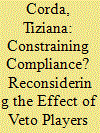

|
|
|
|
|
| Summary/Abstract |
What effect do domestic political and institutional constraints such as veto players have on the success of international sanctions which their countries have been subjected to? Do they facilitate or constrain compliance with them? Although in the literature on sanctions success the role of domestic factors has received extensive attention, a typically public-policy concept such as veto players has remained largely underexplored. The potential of its application to the literature on sanctions was only recently uncovered by sanction scholars who found empirical support for the hypothesis that the larger the size of veto players in a country under sanctions, the higher the probability of compliance. Contrary to their findings, this article theorises a negative causal mechanism whereby a growing divergence in the relevant policy-area preferences of veto players prevents the targeted country from complying with sanctions-related demands. An empirical reassessment of this relationship with George Tsebelis’ original policy-area-specific veto player data confirms this negative effect.
|
|
|
|
|
|
|
|
|
|
|
|
|
|
|
|
| 2 |
ID:
192056
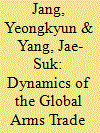

|
|
|
|
|
| Summary/Abstract |
This study identifies security-related factors affecting the formation of the global arms trade network. This empirical analysis using a quantitative approach includes data from multiple sources (the Global Peace Index, Political Stability Index, Democracy Index, Global Terrorism Index, Fragile State Index, and military expenditure as a percentage of GDP) and multiple states analyzed using the ERGM. Arms trade data related to six attributes of states representing their (in)stability is collected and analyzed for 2012-2018. Our findings are as follows: (1) states with greater internal stability import more arms, which affects the formation of the global arms trade network; (2) states with greater external instability import more arms, which also affects the formation of the global arms trade network. This study makes two academic contributions, as follows. First, we analyze factors that form the global arms trade network from a holistic or systemic perspective. Second, we analyze those factors empirically and statistically from a security perspective.
|
|
|
|
|
|
|
|
|
|
|
|
|
|
|
|
| 3 |
ID:
192058
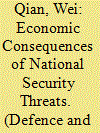

|
|
|
|
|
| Summary/Abstract |
This paper examines the impact of national security threats on a nation’s economic growth and fiscal policy based on a case study of the Korean peninsula. I construct four measures of provocations using a newly-assembled list of North Korean provocative events going back to 1960. The results show that the overall impact of North Korean provocations on South Korea’s short-run economic growth is negligible. Since inter-Korean relations have gone through four phases, this paper also estimates the impact of provocations over each subperiod. Provocations had a significant impact on South Korea’s economic growth during 1960-1970 and 1992-1997 when inter-Korean tensions were high, but the effects took on different signs. While provocations decreased South Korea’s economic growth during 1992-1997, it had a positive impact on South Korea’s macroeconomy before 1970. This paper provides evidence that the effect of national security threats may vary with the responses from the government and political factors such as the relation between the targeted country and the country that inflicts the threat.
|
|
|
|
|
|
|
|
|
|
|
|
|
|
|
|
| 4 |
ID:
192057
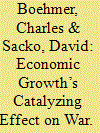

|
|
|
|
|
| Summary/Abstract |
This paper explains the circumstances where economic growth increases the likelihood of interstate war. Optimism created by high and sustained economic expansion permeates a state, increasing elite and mass optimism for the use of deadly force. Without relief, such unbridled sanguinity can lead states to war. However, other forces reduce the probability of war. Regional democracy, bilateral trade, and trade openness slow down the process where states go to war. This paper hypothesizes that key factors raise the temperature of disputes, increasing the likelihood of a political dispute combusting to war, while other attributes inhibit the process to war. Economic growth catalyzes such reactions, while regional and joint democracy impede the probability that a war sparks. This paper produces monadic and dyadic results demonstrating that economic growth increases the likelihood of war, while other factors such as interstate trade openness, bilateral trade, dyadic democracy, and regional democracy slow down the process of war, making war less likely.
|
|
|
|
|
|
|
|
|
|
|
|
|
|
|
|
| 5 |
ID:
192055


|
|
|
|
|
| Summary/Abstract |
In this paper, we study closely the relationship between arms exports, labor productivity and economic growth. Using a connectedness-measurement technology fundamentally grounded in modern network theory, we determine the size and direction of the spillover effects between these three variables. Our findings indicate that shocks from arms exports have direct spillovers over the labor productivity and GDP growth, whereas the reverse is not captured by our data. We also provide a dynamic analysis of the spillovers that confirm the direction of spillovers from arms exports to the other variables. The recent evolution of arms exports from the United States together with the changes in arms exports policy show the timeliness of studying the effects of this particular trade to the rest of the economy.
|
|
|
|
|
|
|
|
|
|
|
|
|
|
|
|
| 6 |
ID:
192059


|
|
|
|
|
| Summary/Abstract |
The purpose of this paper is to examine the performance of Indonesia’s informal offset policy over the period 1976-2014. The paper offers four original academic perspectives: firstly, it is framed by reference to what Indonesia’s former Minister of Technology, Dr Habibie, described as the Progressive Manufacturing Plan, a novel approach in which offset was intended to play a critical supportive role in the systematic development of strategic civil-military industries; secondly, the analysis is structured into three distinctive ‘development-survival-revival’ industrialisation stages that impacted on the performance of both offset and the broader defence economy; thirdly, the study is uniquely different in the sense that the offset case studies all occurred in an era absent of a formal offset policy regime; and lastly, the study provides a wealth of rich data in a subject field well-known for its sensitivity, if not secrecy, and thus is characterised by a paucity of empirical evaluation.
|
|
|
|
|
|
|
|
|
|
|
|
|
|
|
|
| 7 |
ID:
192053
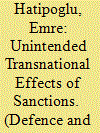

|
|
|
|
|
| Summary/Abstract |
The debate on unintended consequences of sanctions, such as their adverse effects on human rights, public health, or the economy beyond intended sectors in the target state, has become increasingly popular over the last couple of decades. Interestingly, however, this debate has mostly overlooked the transnational aspects of these unintended consequences. This study examines one such aspect, namely the economic spillover of sanctions to neighboring countries. Our global vector autoregression oil and inventory model (GOVAR) simulations on Indonesia, a medium-level oil producer, indicate sanctions may spill over to its neighbors’ domestic economy. The risk and nature of spillover varies with respect to the type of sanctions employed, timing of sanctions, and the macroeconomic indicator in the neighboring state in question. Equity markets appear especially susceptible to a contagion effect. Understanding how a sanction spills over to neighboring states can help sender states design sanctions that minimize regional disruptions.
|
|
|
|
|
|
|
|
|
|
|
|
|
|
|
|
|
|
|
|
|